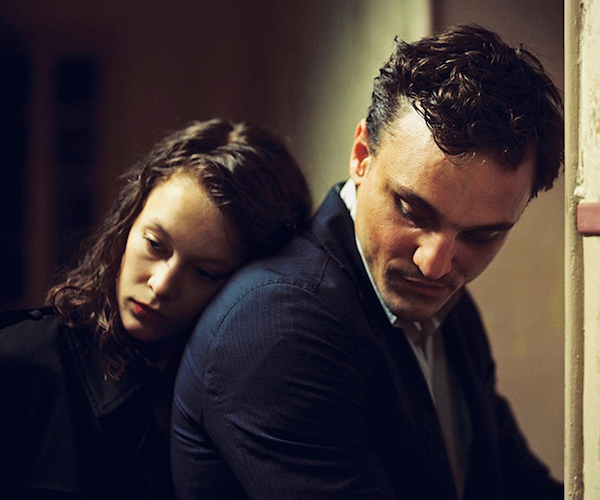Film Review: “Transit” — Europe’s Unburied Past
By Peg Aloi
In Transit, Christian Petzold explores why the ghosts of Europe’s troubled past are stirring once more.
Transit, directed by Christian Petzold. Screening at Kendall Square Cinema and Coolidge Corner Theater.

A scene from “Transit.” Photo: Courtesy of Schramm Film / Marco Krüger
Christian Petzold’s Transit is purposefully vague, even somewhat confusing, about time. Adapted from Anna Segher’s 1942 novel of the same title, it is a story about Nazi occupation, focusing on the desperate attempts of people to flee their homes and find safe passage abroad. Segher’s examination of repression in the Third Reich is transposed to the present day, and that is not such a far-fetched idea. Fascism is once again on the rise in Europe, as anyone who’s been following the news of the last several years knows. Some films comment on the present by staying firmly in the past (consider Good Night and Good Luck); others, such as this film, dramatize how the past never really goes away, and traces the ways that old patterns, in this case those of race hatred, remain more or less entrenched in Europe’s haunted cities.
Loud sirens moan through the streets of Paris as people hurry to their destinations while looking over their shoulders. The wailing police vans are modern, but their frightening sounds echo the blare of vehicles — sent to round up Jews — that we have heard in just about every film set during World War II. It is a chilling sound that has imprinted itself upon the modern psyche. We see a young man and his friend discuss how to escape the city, which is under siege by German soldiers. Georg (Franz Rogowski, who bears a striking resemblance to a younger Joaquin Phoenix) agrees to undertake a dangerous job in order to raise money for his escape. He must help a dissident writer escape to Marseilles via train; injured and weak, the author dies before their journey is completed. Georg then decides he will try to use the writer’s papers to secure his own safe passage. A bit curious, perhaps triggered by a sense of duty-bound humanity, Georg reads some of the author’s just-completed novel, and is moved by it. An unidentified narrator occasionally comments on the action. I found myself wondering if this was meant to be the voice of the writer, whose story ends abruptly but seems to ruminate on events that are endangering others.
Confusion and a sense of foreboding abound, as Georg calmly tries to leverage his position in a city where officials charged with arranging transit arrangements are overworked, stressed by the universal mood of desperation. Marseilles is beautiful, but its customary air of pleasure and leisure is overwhelmed by fear and grief. Georg is nearly penniless and starving yet, when he manages to get some money, he spends it on acts of kindness to others. He tries to help a refugee family; he also befriends a young boy who is playing alone in the street. A young woman named Marie (Paula Beer, seen in 2017’s Frantz and more recently in Never Look Away) keeps running into Georg. She seems to think he is her husband, who has been due to arrive for days — yet every time she is disappointed when she sees Georg’s face. Marie, it turns out, was married to the recently-deceased writer, but is unaware of his fate, so she is still expecting that he will join her.
Georg is captivated by Marie’s beauty, her air of sadness and hope. He also feels responsible for her fate, since he was forced to leave her husband behind. Strangely, Georg isn’t able to plan for his own escape once he becomes intimately aware of the fragile plights of others. It is as if he is sustained by his own acts of kindness, strengthened by acts of humanity at a time when people are literally being hunted in the streets.These two actors mesh well together, effortlessly generating a compelling chemistry borne of a shared sense of unease and immediacy.
As seen in his previous films, Barbara (2012) and Phoenix (2014), Petzold is a filmmaker with a deep interest in the history and emotional legacy of his native culture. His films explore troubled eras in Germany’s past, ranging from the world wars and the Eastern Bloc to contemporary issues of rising white nationalism. With Transit, set in a time and place that looks and feels very much like the present, Petzold explores why the ghosts of Europe’s troubled past are stirring once more. Perhaps it is only by walking alongside these restless and relentless spirits that we might begin to understand why we won’t let them stay buried.
Peg Aloi is a former film critic for The Boston Phoenix. She taught film and TV studies for ten years at Emerson College. Her reviews also appear regularly online for The Orlando Weekly, Crooked Marquee, and Diabolique. Her long-running media blog “The Witching Hour” can be found at at themediawitch.com.
